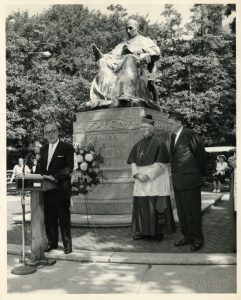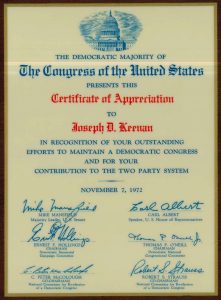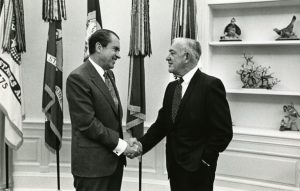
The Special Collections of Catholic University is home to many valuable labor collections. Prominent among these are the papers of Terence V. Powderly, John Mitchell, John Brophy, and Phillip Murray. Less well known, but no less impactful, are the papers of Chicago natives Harry C. Read and Joseph Daniel Keenan (1896-1984). The latter is the subject of this blog post. Referred to by biographer Francis X. Gannon as ‘Labor’s Ambassador,’ the talented, modest, and patriotic Keenan was a labor leader who was an important labor-government liaison during the Second World War, a significant force in labor’s post war support for Democratic presidential candidates from Harry S. Truman to George C. McGovern, and a key advisor to George Meany, long-time leader of the American Federation of Labor-Congress of Industrial Organizations (AFL-CIO).

Born in 1896, Keenan was the eldest of eight children. He left school at an early age to help support his family after his father was injured and he became an electrician by trade. He participated in the labor movement in Chicago, beginning with the International Brotherhood of Electrical Workers’ (IBEW) Local 134 in 1914, and then from 1937 as Secretary of the Chicago Federation of Labor. In 1940, he moved to Washington, DC, to work with President Franklin Roosevelt’s National Defense Advisory Commission to mobilize national defense in the face of Hitler’s European onslaught. He eventually became the Vice Chairman for Labor of the War Production Board, 1943-1945, where he worked effectively to stabilize industrial relations in the construction field and to halt strikes and work stoppages while arbitration agreements were conducted. He served in postwar Germany, 1945-1948, as both an advisor to American commander General Lucius D. Clay and as President Truman’s special coordinator between labor and industry for reorganizing trade unions.

Keenan returned home for the 1948 elections where he was first director of the League for Political Education where he was credited with an important role in Truman’s upset victory over Thomas Dewey. He later served as labor’s campaign liaison with presidents John F. Kennedy (1960) and Lyndon B. Johnson (1964), Vice President Hubert Humphrey (1968), and Senator George McGovern (1972). He served as first Secretary of the Building and Construction Trades Department of the American Federation of Labor (AFL), 1951-1954, and IBEW International Secretary, 1954-1976. He was a key friend and advisor to George Meany when the latter merged the rival AFL and CIO into one organization in 1955 and Keenan served thereafter as Vice President and Executive Council member of the combined AFL-CIO.

Keenan was an active Catholic layman and was honored with the papal medal, Pro Ecclesia et Pontifice Award, in 1973 and an honorary doctorate from The Catholic University of America (CUA) in 1974. For the latter, Catholic University stated “Like his patron and fellow craftsman, Joseph the Carpenter, he richly deserves the title ‘Justus Vir.’” He was also a recipient of the Medal of Merit and Medal of Freedom by President Harry S. Truman for World War II services. Keenan was known to support civil rights organizations and helped found the Joint Action in Community Service (JACS), the political organization behind Jobs Corps that trained millions of disadvantaged, including minorities, for employment. [1] He was also devoted to the State of Israel. He was married three times, first to Ethel Fosburg, by which they had son Joseph Jr; second to Mytle Fox, whose son John was adopted by Keenan; and third to Jeffie Hennessy. His burial mass in 1988 was held at Holy Name Cathedral in Chicago. For more information on Keenan, see his papers at Catholic University and a 1971 oral history transcript at the Harry Truman Library.
[1] Francis X. Gannon. Joseph D. Keenan, Labor’s Ambassador in War and Peace. Lanham, New York, and London: University Press of America, 1984, p. 155.
